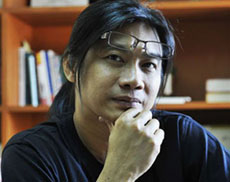When the Thai military staged a coup and replaced a democratically elected government last month, ordinary people in Burma and Burmese working in Thailand reacted with a sense of bemusement.
The neighbors had traded places: the former military-run pariah state is being embraced by the West for its democratic transition, while a long-standing United States ally had come under the boot of the Thai army, which has come in for strong international criticism.
Soon, a sense of irony took over among the Burmese, leading to jokes on social media.
When the Thai junta named itself the National Council for Peace and Order (NCPO)—conjuring up memories of Burma’s former State Peace and Development Council (SPDC)—and it began an Orwellian-style “happiness campaign” with free dance shows, meals and haircuts, the Burmese were struck with a mix of hilarity and disbelief.
Thailand was a stable nation and one of the strongest democratic and free countries in Southeast Asia. The kingdom has relatively free press, influential civil society groups and is actively engaged with Western nations and its Asian neighbors. And of course, it is Asia’s most popular international tourist destination.
After the initial reactions among the Burmese wore off, however, concerns over the Thai coup grew. No one wants to see Thailand’s democracy fail, while the country’s sinks into political and economic stagnation.
Until recently, Burmese politicians and activist fleeing repression in their country sought refuge in Thailand and enjoyed its democratic space and respect for human rights; from Thailand they staged media and political campaign against military rule in Burma.
Ethnic armies were based along the Thai-Burma border and set up offices and businesses there, while buying arms from the black market in Thailand to fight their insurgency against Burma’s military-run government.
Some recent Thai media suggested that Thailand’s populist, deposed prime minister Thaksin Shinawatra might set up a democratic movement in exile in neighboring Cambodia.

Some Burmese colleagues of mine, who spent many years in exile in Thailand for their democratic activism, could not help joking and said the movement would need to find some generous sponsors, preferably Western powers. In jest, they said the Thai opposition now needs leaders who, like Aung San Suu Kyi or U Win Tin, would be able to put up with many years of detention, house arrest or torture.
There is great unease, nonetheless, among Burmese democracy and human rights activists over the Thai coup: when Thailand, after all its past democratic success, can regress to military rule, how long will Burma’s road to genuine democracy be?
Jimmy, a leader of the 88 Generation Peace and Open Society who spent many years behind bars as a political prisoner said, “Thailand is a leading country in Southeast Asia. I don’t want a coup in Thailand as it is a model for other Asean countries.
“[The coup] shows how important national reconciliation is. If this does not succeed, the army will always be involved in Thai politics,” he said, underlining the need for reconciliation in Burma.
Jimmy added that President Thein Sein, who has publicly pledged to lead Burma through a transition to democracy, should respond. “Thein Sein is trumpeting Burma as heading towards democracy—he can’t remain silent.”
The latter is, however, exactly what Burma’s reformist government appears to have done.
In another ironic twist, the first visit by Thai junta foreign affairs officials was to Burma, of all places, to explain the coup to the former military men that still run the country. Thai officials asked Burma, in its role as chair of the Association of Southeast Asian Nations (Asean), to help tell the outside world “the truth” about the Thai coup.
In keeping with Asean’s long-standing policy of non-interference in domestic affairs (and not embarrassing) of its members, Burma’s government refrained from making critical comments about the Thai coup.
Surprisingly, Hla Swe, a former junta colonel and now a lawmaker from Burma’s ruling Union Solidarity and Development Party, was more critical and said, “A coup is not good.”
The Burmese are also keenly aware of the differences between military rule in Thailand and the former military regime and current government in their country.
The Thai army has carried out more than a dozen coups in past decades, but always relinquished power to a civilian government after a number of years. The Thai military also retains respect among large swathes of the Thai people.
Nan Khin Htwe Myint, a politician with the National League for Democracy (NLD), said, “In Thailand, once the country’s situation returns to normal, the army gives power back to the people. In Burma, it’s been different.”
The Burma Army staged two coups, one in 1962 and one in 1988, and ruled the country for more than half a century. The military is hated and mocked by most people in Burma after the generals brutally suppressed dissent and ran the economy of the resource-rich country into the ground.
Today, many Burmese still feel that the country is under control of military men and ex-generals in the government and Parliament—in spite of the “sweeping reforms” celebrated by Western governments. The despised military-drafted Constitution gives the army direct control over a quarter of Parliament and other controls over government.
The Burmese continue to loathe the retired and active generals, and their cronies, who control most assets in Burma and have positioned themselves to reap the benefits of the economic boom that was kick-started by the democratic transition.
We are now stuck with the Burma Army’s “disciplined democracy”—the generals simply decided to take off their uniforms in order to continue to run the country, while mass murderers and former coup makers enjoy impunity and live in lavish compounds.
Let’s hope that the Thai army will soon return to its barracks, and that Burma’s military will pick up on the idea and leave Burmese politics once and for all.
















